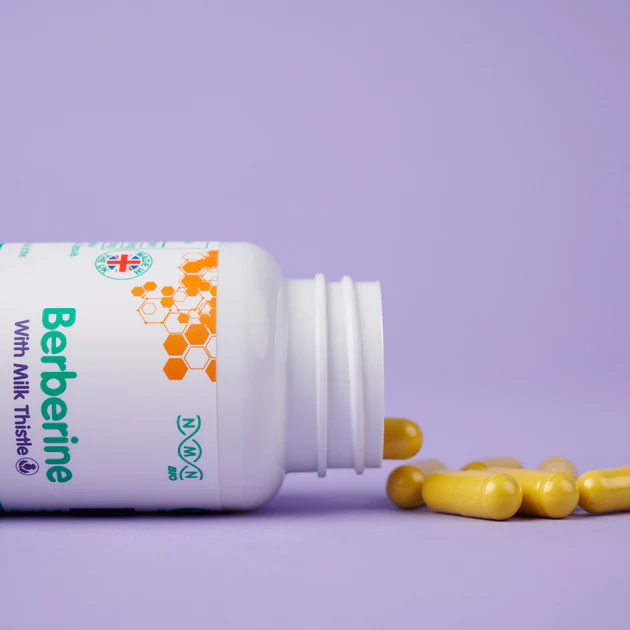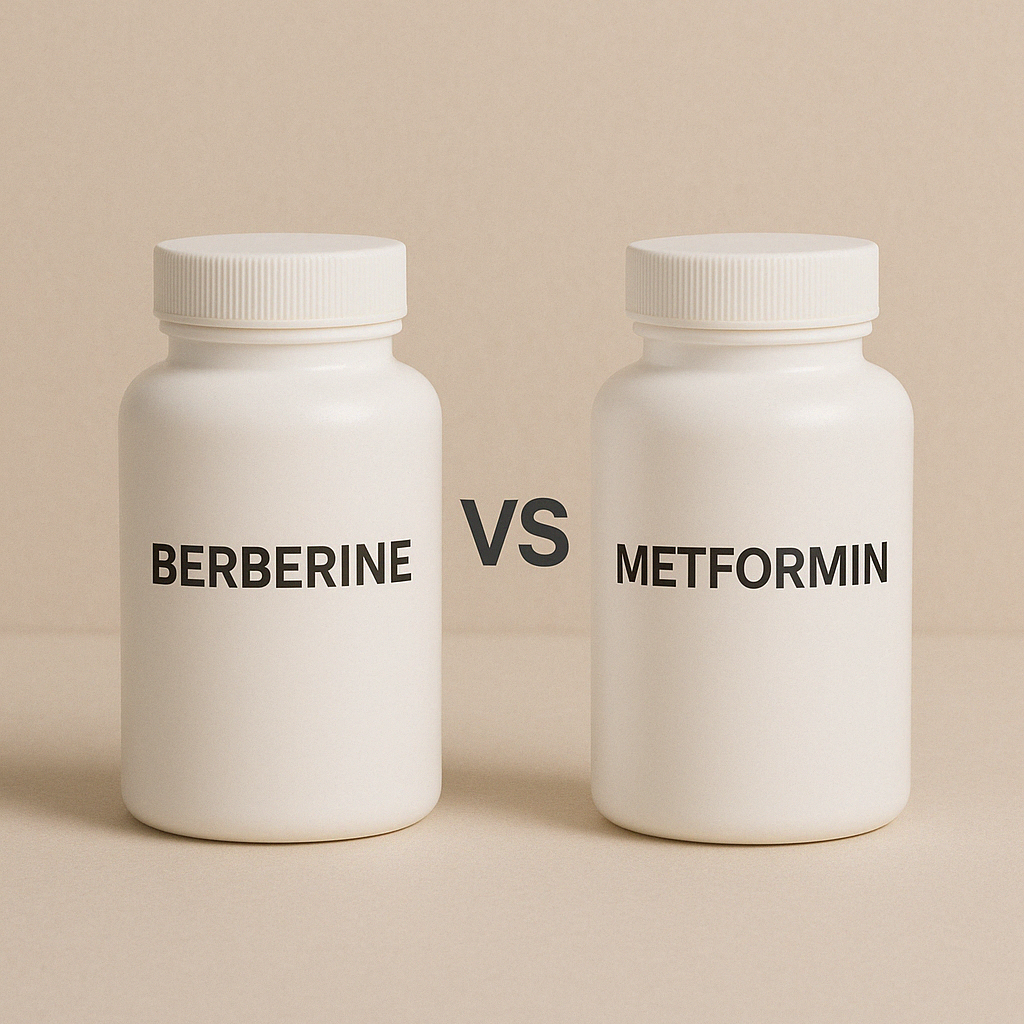Berberine vs Metformin for Weight Loss and Health

Berberine vs Metformin for Weight Loss and Health
Berberine is celebrated for improving blood sugar, aiding weight loss, and boosting heart health. Extracted from various plants, this compound has a long history in traditional medicine and is now backed by modern science. Learn about the top berberine benefits and how they can enhance your health.
Key Takeaways
-
Berberine is a bioactive compound with benefits in metabolic health, including blood sugar management, weight loss, and cardiovascular improvements.
-
Research indicates that berberine can significantly lower blood sugar levels and improve insulin sensitivity, making it an effective alternative to metformin for diabetes management.
-
Berberine promotes weight loss by inhibiting fat storage and enhancing fat breakdown, while also improving cholesterol levels and supporting women’s health in managing PCOS.
What is Berberine

Berberine is a powerful bioactive compound found in several plants, including European barberry, goldenseal, phellodendron, goldthread, and Oregon grape. As a natural alkaloid, it has gained attention for its impressive health benefits—especially in metabolic health. Modern research highlights berberine’s ability to support blood sugar regulation, weight management, and cardiovascular function, making it a popular natural supplement for those seeking to enhance their overall well-being.
Used for over 3,000 years in traditional Chinese and Ayurvedic medicine, berberine was historically relied upon to treat infections, digestive disorders, and inflammatory conditions. Its long-standing use speaks to its therapeutic versatility and safety profile.
Today, berberine continues to be studied for its potential in managing common metabolic conditions such as type 2 diabetes, high cholesterol, and polycystic ovary syndrome (PCOS). Its multifaceted benefits and plant-based origins position berberine as a trusted ally in the world of natural health solutions.
Why Blood Glucose Control Matters
Managing blood sugar is essential not only for metabolic health but also for weight loss and long-term vitality. When blood sugar levels spike frequently, the body responds by producing excess insulin. Over time, this can lead to insulin resistance, fat storage, particularly around the abdomen, and difficulty losing weight. Unstable blood sugar is also linked to energy crashes, sugar cravings, and chronic inflammation, all of which undermine metabolic function and contribute to premature ageing.
By helping to regulate blood sugar and reduce insulin spikes, berberine supports fat metabolism, appetite control, and sustained energy, key pillars of effective weight management. In the long term, stable blood sugar levels are associated with a reduced risk of type 2 diabetes, cardiovascular disease, cognitive decline, and even certain cancers, making glycaemic control a cornerstone of both healthy ageing and longevity.
Berberine aids in this process by promoting insulin secretion and increasing insulin sensitivity—two vital mechanisms for glucose regulation. Consulting a physician before using berberine supplements is recommended, especially for individuals with type 2 diabetes, to ensure proper product selection and dosage.Berberine Lowers Blood Glucose
Berberine significantly enhances glucose processing, reducing blood glucose levels and supporting glucose absorption. It lowers blood glucose levels and improves insulin sensitivity, supporting effective blood glucose management and glucose production, crucial for those with diabetes or prediabetes.
Improving Insulin Sensitivity
Improving insulin sensitivity is a cornerstone of metabolic health and a key goal in the treatment of type 2 diabetes, weight gain, and metabolic syndrome. When cells become resistant to insulin, the body needs to produce more of it to move glucose into cells. Over time, this can lead to chronically elevated insulin levels, which promotes fat storage (especially around the abdomen), increases inflammation, and makes weight loss significantly more difficult.
Berberine, like metformin, enhances insulin sensitivity by activating AMPK (AMP-activated protein kinase), a critical energy-regulating enzyme. This activation improves the body’s ability to use glucose effectively, reducing insulin resistance and promoting better blood sugar control.
Studies have shown that berberine increases the expression of insulin receptors on cells, enhancing glucose uptake and metabolism, just like metformin does. This makes berberine a promising natural alternative or companion to metformin for those looking to improve their insulin response through supplementation.
The connection to weight loss is clear: greater insulin sensitivity means less fat storage, reduced cravings, and improved energy balance, all of which support a healthier body composition and easier weight management.
For improving insulin sensitivity, typical berberine doses range from 500 mg to 1,500 mg per day, usually taken in divided doses with meals. Staying within this range ensures consistent support for glucose metabolism while minimising side effects.
Berberine for Weight Loss and Fat Metabolism
Berberine not only supports blood sugar regulation—it also plays a powerful role in weight loss and fat metabolism. By improving insulin sensitivity and activating AMPK (the same metabolic pathway as metformin), berberine helps reduce fat storage and promotes fat breakdown at a cellular level.
Studies show that daily doses of 1,000–1,500 mg can support weight loss, especially when paired with a nutrient-dense diet and regular movement. For best results, it's recommended to take 500 mg two to three times per day with meals.
Berberine has been shown to suppress the formation of new fat cells (adipogenesis) while enhancing the body’s ability to use stored fat for energy. This dual action makes it an effective tool for weight management, especially in individuals struggling with insulin resistance or those consuming a higher-fat Western diet.
Animal and human studies also suggest that berberine can help mitigate weight gain, even when caloric intake remains the same, by improving metabolic efficiency and reducing inflammation—two key drivers of obesity and metabolic dysfunction.
Berberine vs Metformin: A Natural Alternative to a Common Prescription

One of the most fascinating aspects of berberine is its potential as a natural alternative to metformin, one of the most commonly prescribed drugs for type 2 diabetes. Both compounds are known for their ability to lower blood glucose levels and improve insulin sensitivity, but how do they compare? And is berberine truly a viable option for those looking to manage their metabolic health more naturally?
Similar Mechanisms of Action
Metformin and berberine share strikingly similar mechanisms of action, particularly in how they affect cellular energy metabolism. Both activate an important enzyme known as AMP-activated protein kinase (AMPK)—often described as the body's "metabolic master switch." AMPK helps regulate glucose uptake, fat oxidation, and energy production, making it central to managing blood sugar and improving insulin sensitivity.
By activating AMPK, both berberine and metformin:
-
Inhibit glucose production in the liver
-
Improve glucose uptake in the muscles
-
Enhance insulin sensitivity
-
Support fat metabolism
This shared pathway makes berberine a compelling natural parallel to metformin, especially for individuals seeking plant-based interventions or those unable to tolerate prescription drugs.
Comparative Clinical Evidence
A number of clinical trials and meta-analyses have evaluated the efficacy of berberine in comparison to metformin, particularly for patients with type 2 diabetes. One notable study published in the journal Metabolism found that berberine (500 mg taken three times daily) was just as effective as metformin (500 mg three times daily) in controlling blood glucose, hemoglobin A1c (HbA1c), and insulin sensitivity over a 3-month period.
In this study, berberine not only matched metformin in glycaemic control but also showed favourable effects on lipid metabolism, lowering triglycerides, total cholesterol, and LDL cholesterol more effectively than metformin.
These findings have been echoed across multiple reviews, with many experts suggesting that berberine could be considered a first-line supplement for those with insulin resistance, prediabetes, or type 2 diabetes.
Berberine Offers Broader Metabolic Benefits
While both compounds support blood sugar control, berberine’s benefits appear to extend beyond glycaemic regulation:
-
Weight Management: Berberine supports weight loss by inhibiting fat storage and enhancing fat breakdown, an area where metformin’s effects are modest.
-
Gut Health: Berberine promotes a healthier gut microbiome, improving the balance of beneficial bacteria such as Akkermansia muciniphila, which is strongly linked to improved metabolic health.
-
Lipid Regulation: Berberine has shown stronger cholesterol-lowering effects than metformin in some trials, particularly in reducing LDL and triglycerides.
-
Women’s Health and PCOS: Berberine improves insulin sensitivity and hormonal balance in women with PCOS, sometimes outperforming metformin in restoring ovulation and reducing androgen levels.
Side Effects and Tolerability
While metformin is effective, it's not without side effects. Common complaints include:
-
Gastrointestinal distress (nausea, bloating, diarrhoea)
-
Vitamin B12 depletion with long-term use
-
Potential risk of lactic acidosis (although rare)
Berberine may also cause mild gastrointestinal issues, such as constipation or stomach cramps, especially at higher doses or when taken on an empty stomach. However, berberine does not interfere with B12 absorption and is generally well-tolerated when dosed appropriately (e.g., 500 mg 2–3 times daily with meals).
When to Consider Berberine Over Metformin

Berberine may be a preferred choice for:
-
Those who experience side effects with metformin
-
Individuals looking for a more holistic, plant-based approach
-
Early intervention in prediabetes or insulin resistance
-
Support alongside lifestyle interventions like diet and exercise
-
Women with PCOS seeking hormone balance and menstrual regulation
Can Berberine Replace Metformin?
For some individuals, yes—but not always. While berberine shows great promise, it’s important to remember that metformin is a well-studied pharmaceutical drug with decades of use behind it. Berberine may serve as a complementary or alternative therapy, particularly for those with mild to moderate insulin resistance or for individuals focused on prevention.
Anyone considering switching from metformin to berberine should consult with a healthcare provider, especially if they are currently managing blood sugar with prescription medication.
Optimal Berberine Dosage
For Blood Sugar Management
To support healthy blood glucose levels and insulin sensitivity, studies recommend a daily dose between 900 mg and 2,400 mg. A commonly used and effective dose is 1,500 mg per day, divided into two or three servings. Taking berberine with meals helps regulate postprandial (after-meal) blood sugar spikes and improves overall metabolic function.
For Weight Loss
Berberine can also assist with weight management, particularly when paired with a nutrient-rich diet and active lifestyle. It has been shown to inhibit fat storage and promote fat breakdown. Effective weight loss results are typically observed with daily doses ranging from 1,000 to 1,500 mg, though some protocols recommend up to 3,000 mg per day. Again, splitting the dose and taking it with meals supports better absorption and gastrointestinal comfort.
Take our quiz to get your personalised supplement list.
Your body, your routine, your biohacks!
Summary
Berberine is more than just a natural supplement—it’s a potent ally for metabolic health. Backed by both ancient wisdom and modern clinical research, berberine has demonstrated powerful effects on blood sugar regulation, weight management, cardiovascular function, and insulin sensitivity. Its ability to activate AMPK, the body’s metabolic master switch, puts it on par with pharmaceutical options like metformin—without the common side effects.
Whether you're looking to reverse insulin resistance, support healthy fat metabolism, or manage conditions like PCOS, berberine offers a well-rounded, plant-based solution. Its additional benefits for gut health and inflammation make it one of the most versatile and promising supplements for long-term wellness and healthy ageing.
If you're seeking a science-backed, holistic approach to improving your health naturally, berberine could be the missing piece.
Frequently Asked Questions
What is berberine and where is it found?
Berberine is a powerful bioactive compound naturally found in plants like European barberry, goldenseal, phellodendron, Oregon grape, and goldthread. Traditionally used in Chinese and Ayurvedic medicine, it’s now gaining recognition in modern health circles for its ability to support blood sugar regulation, fat metabolism, and cardiovascular health—many of the same areas targeted by prescription medications like metformin.
How does berberine help manage blood sugar—and how does it compare to metformin?
Berberine works by activating AMPK (AMP-activated protein kinase), the same cellular enzyme targeted by metformin. This improves how the body uses glucose, enhances insulin sensitivity, and reduces the liver’s glucose production. In fact, clinical studies show berberine can be as effective as metformin in lowering fasting blood sugar and HbA1c levels—making it a compelling natural alternative or complementary option for people managing type 2 diabetes or insulin resistance.
What are the recommended dosages for berberine?
For blood sugar control and metabolic support, the recommended dose of berberine typically ranges from 900 to 2,400 mg per day, split into two or three servings. For weight loss, cholesterol management, or broader metabolic improvements, studies suggest doses of 1,500 to 3,000 mg daily may be beneficial. These dosages often mirror those used in clinical comparisons with metformin. Always take berberine with meals and consult a healthcare provider before starting supplementation, especially if you're currently taking blood sugar-lowering medications.
Are there any side effects of berberine compared to metformin?
While metformin is effective, it commonly causes gastrointestinal side effects like nausea, bloating, and diarrhoea—and long-term use may reduce vitamin B12 levels. Berberine is generally well tolerated but may cause mild digestive discomfort such as constipation, gas, or stomach cramping, particularly at higher doses. Unlike metformin, it doesn’t interfere with B12 absorption and is unlikely to cause lactic acidosis. As with any supplement, it’s best to speak with your doctor—especially if you’re on medication for blood sugar or cholesterol.
Researched and reviewed by Dr Elena Seranova, Ph.D.
Dr Seranova holds a master's degree in Translational Neuroscience from the University of Sheffield, UK, and a Ph.D in Stem Cell Biology and Autophagy from the University of Birmingham, UK. She is a published author in multiple peer-reviewed journals, including Cell Reports and Developmental Cell.




